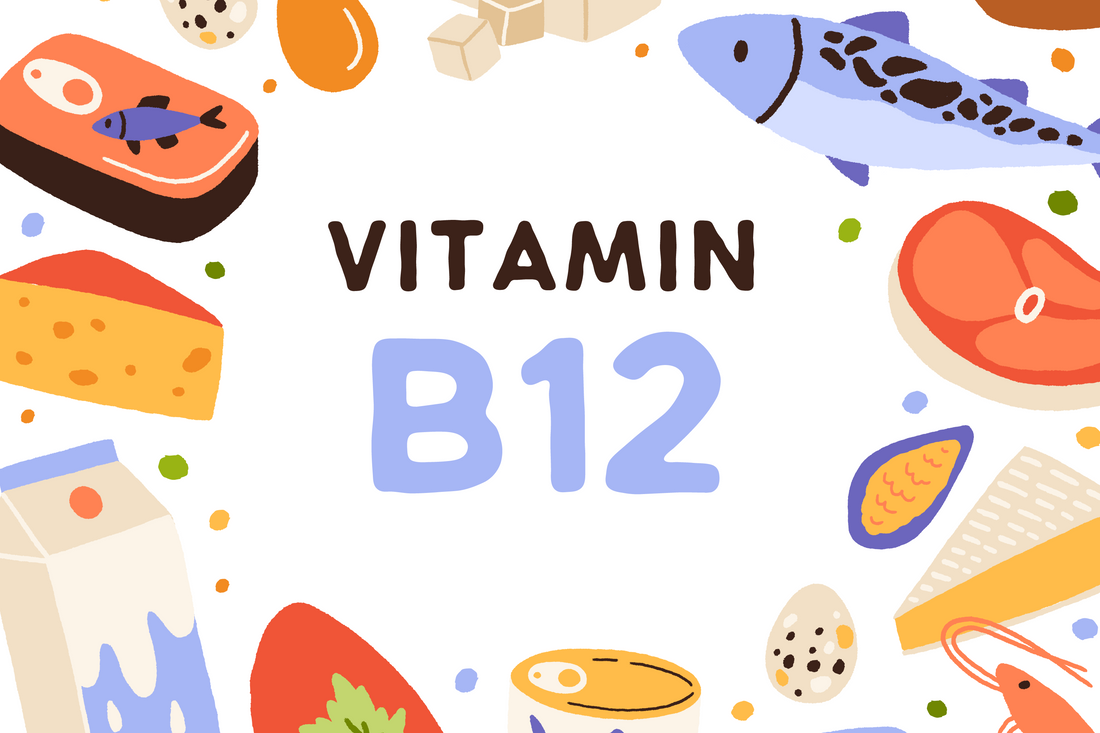Maintaining a balanced and nutritious diet is crucial for our overall health and well-being. Among the essential nutrients, vitamin B12 holds a prominent place. It plays a vital role in numerous bodily functions, including the production of red blood cells, DNA synthesis, and proper nerve function (1). Despite its significance, many people are unaware of the importance of vitamin B12 and the potential consequences of its deficiency. In this blog, we will explore why vitamin B12 is crucial for our health and discuss various sources to ensure an adequate intake of this essential nutrient.
Why do we need Vitamin B12?
Vitamin B12, also known as cobalamin, is a water-soluble vitamin that is necessary for the proper functioning of our body. Here are some key reasons why we need vitamin B12:
-
Red blood cell production
Vitamin B12 plays a crucial role in the synthesis of red blood cells, which are responsible for carrying oxygen throughout the body (1). A deficiency in B12 can lead to a condition known as megaloblastic anemia, characterized by fatigue, weakness, and shortness of breath (2).
-
Brain and Nerve function
Vitamin B12 is essential for maintaining a healthy nervous system. It helps in the formation of the protective covering of nerves called the myelin sheath. Without adequate B12, nerve function can be impaired, leading to tingling sensations, numbness, and even neurological disorders (1). Optimal vitamin B12 levels support cognitive function, memory, and overall brain health.
A clinical trial conducted on 900 older individuals at high risk of cognitive impairment found that daily supplementation of 400 mcg of folic acid and 100 mcg of vitamin B12 for two years significantly improved immediate and delayed memory (4).
Another two-year study conducted on elderly adults reported that a daily regimen of 800 mcg of folic acid, 500 mcg of vitamin B12, and 20 mg of vitamin B6 significantly reduced the rate of brain degeneration compared to placebo treatment (4).
-
DNA synthesis
Vitamin B12 is involved in the synthesis of DNA, the genetic material present in all cells (1). It aids in cell division and the production of new cells, which is vital for growth and repair.
-
Energy production
B12 plays a crucial role in converting carbohydrates into glucose, which serves as the primary source of energy for our body. Insufficient B12 levels can lead to fatigue and a lack of energy.
-
Mood regulation
Research suggests that vitamin B12 may play a role in mood regulation and the prevention of mood disorders, such as depression.
A study conducted on 3,884 elderly men and women with depressive disorders found that those with vitamin B12 deficiency were almost 70% more likely to experience depression than those with normal vitamin B12 levels (4).
Who is at risk of Vitamin B12 deficiency?
B12 deficiency can affect individuals at all ages, but most particularly elderly individuals. Infants, children, adolescents and women of reproductive age are also at high risk of deficiency in populations where dietary intake of B12-containing animal-derived foods is restricted (7).
Older adults are at a higher risk of B12 deficiency because the body's ability to absorb the vitamin decreases with age.
Absorption rates improve with supplementation; therefore, patients older than 50 years and vegans or strict vegetarians should consume foods fortified with vitamin B12 or take vitamin B12 supplements (6).
Up to 30% of adults over 51 years of age have atrophic gastritis with low stomach acid excretion, it is recommended that they take Recommended Daily Intake of vitamin B12 with supplements and/or fortified foods (5).
Sources of Vitamin B12
Vitamin B12 is naturally found in animal-based food products. Here are some excellent sources of vitamin B12:
Meat and poultry: Beef, pork, lamb, and poultry (chicken, turkey) are rich sources of vitamin B12. Incorporating lean cuts into your diet can provide an ample supply of this essential nutrient (1).
Fish and seafood: Fatty fish such as salmon, trout, and tuna are not only a great source of omega-3 fatty acids but also contain vitamin B12. Other seafood options like clams are also good source of vitamin B12 (3).
Dairy products: Milk, cheese, and yogurt are excellent sources of vitamin B12, especially for those following a vegetarian diet (1).
Eggs: Both the yolk and egg whites contain vitamin B12, making eggs a convenient and nutritious option (1).
Fortified foods: In addition to food products, breakfast cereals and nutritional yeast are fortified with vitamin B12 (1). These fortified options are particularly beneficial for vegans and vegetarians.
Supplements:
In cases where dietary sources are limited or vitamin B12 requirements are not being met, supplements can be a convenient option. Consult your healthcare professional to determine the appropriate dosage that is suitable for you.
Conclusion:
Vitamin B12 is an essential nutrient that plays a crucial role in various bodily functions. From red blood cell production to nerve function, Energy production, mood regulation and DNA synthesis, B12 is indispensable for our overall health and well-being.
While it's generally best to obtain nutrients from whole foods, some individuals may need to supplement their diet with vitamin B12. This includes vegans, vegetarians, older adults, and individuals with certain medical conditions that impair vitamin B12 absorption. If you are concerned about your B12 levels, you can speak with your doctor, who can recommend the best course of action.
References:
-
https://ods.od.nih.gov/factsheets/VitaminB12-HealthProfessional/
-
https://www.nhs.uk/conditions/vitamin-b12-or-folate-deficiency-anaemia/symptoms/
-
https://www.health.harvard.edu/staying-healthy/the-a-list-of-b12-foods
-
https://lpi.oregonstate.edu/mic/vitamins/vitamin-B12
-
https://www.ncbi.nlm.nih.gov/pmc/articles/PMC5130103/
-
https://pubmed.ncbi.nlm.nih.gov/28925645/
-
https://pubmed.ncbi.nlm.nih.gov/28660890/


